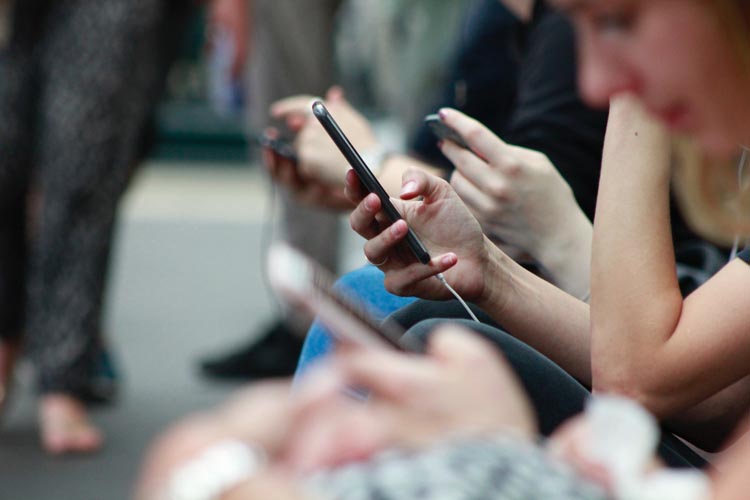5 Steps to a Digital Detox and Why You Need It
RAFT Team, December 14, 2020
These days we’re all online. In fact, it seems like it’s harder and harder to pull away from the computer or our phones, The world is shifting fast and we feel disconnected at home, even when we talk to our two-dimensional friends on Zoom. Somehow, checking the news, scrolling social media, and the ding of a text alert makes us feel more connected. In actuality, for many, these things bring a greater sense of isolation and heightened anxiety. Stepping away from screen time with a digital detox can increase your sense of connection with those you love.
Social media companies intentionally build addictive products.
And it’s no fault of our own. Media companies make addiction their business model. Television shows end on cliffhangers to ensure you’ll watch the next episode. Twitter and Instagram automatically show you new content. The longer you scroll, the more you’ll see. They autoplay content to draw you in. The notifications of comments, likes, and new follows encourage you to come back again and again the instant they hit your device. Games increase difficulty to give you something to conquer. Even devices like your fitbit gamify exercise to keep you striving to achieve that next goal. None have a natural stopping point. None encourage you to step away. Because the longer you scroll and the more you see, the more money they’ll make.
Media companies know that these alerts make us feel good. Studies show that every time you get a notification, your brain releases a shot of dopamine. It feels great! So you text a friend, post to get a like, and keep checking to see how many additional followers you’ve gained. And when we don’t get any, we wonder where we’ve gone wrong.

All of these techniques give you a false sense of accomplishment. They try to convince you that you’re connected, that your value increases with the more “engagements” you have, and that you must stay on so you don’t miss anything. As beautifully packaged as these apps and games arrive, they’re really just the newest slot machine. They leave you empty, unfulfilled, and lonely.
Social media isn’t bad, but too much social media can have negative effects. Here are a few digital detox tips on how to take back your time, your self-worth, and your confidence, and regain a healthy balance in your life:
1. Limit Your Scroll.
Fight back against the built-in enticement of your apps by limiting your scroll. Monitor your use by using a screen time tracking program. Many of these will allow you to predetermine limits on each app to help remind you to step away when you’ve reached the limit you’ve set for yourself.
You can also set times that you will catch up on news, rather than checking in every time you have a lull in your day. Waiting in line to pick up a coffee order? Resist the urge to check your phone. Instead, allow your sense to explore the space you’re in. Enjoy your environment. Notice the people around you and share a friendly smile. Breathe in the scent of freshly ground beans. Listen to the espresso grinder and the milk frother as people’s orders are put together. Do all you can to connect with the space you’re in rather than escaping into an online world.

2. Stop Comparing.
How many times have you seen a friend’s post and felt a twinge of envy? A vacation, a promotion, a pregnancy announcement. Or maybe you’ve seen an outfit or home decor that filled you with dissatisfaction with what you currently own. You aren’t alone. It’s human nature to compare our position, possessions, or posture with someone else’s. You wonder how so-and-so got so many followers. Or why your friends don’t comment as much as others.
When these thoughts creep in, it’s time to step away from these digital relationships for a while. Invest in face-to-face relationships. Deepen the friendships you have with a phone call. Pop a card in the mail to let someone know you’re thinking of them. Build your gratitude practice so you can relearn contentment with all you already have. Who you are and what you have is enough. Don’t let social media convince you otherwise.
3. Track Your Screen Time.
You probably spend more time on your digital devices than you realize. A study done by Provision Living revealed that 1 in 3 people think they spend less time on their phone than they really do. Four out of five people believe their screen time is below the national average. This isn't even taking into account how American’s screen time has skyrocketed during the pandemic.
Try tracking your screen time for a week. See what it reveals about your usage. It may show you that you’re trying to connect with others more. If so, try doing this away from the screen on a more personal level — call a friend or schedule a time to chat. If you’re checking the news more, perhaps consider scheduling a time for yourself in the morning and the evening to check the highlights and invest your extra time into making good news for yourself by practicing self-care, learning a new skill, or picking up a new hobby. Meditate. Don’t condemn yourself. Rather, look for ways to deepen what your time shows you that you’re already pursuing.

4. Have Courage to Disconnect.
Fear of missing out is real, especially when you’re confined to your home during a raging pandemic. It’s natural to check the news, to be in the know. To see what friends are up to. To keep in touch with family. But don’t be afraid to step away for a bit. Whether it’s a certain time each evening or for an entire weekend a month, have courage to stop the scroll, put down your phone, and live with only what’s in front of you for a time.
Not only will you refresh your heart, you’ll help break the habit of repeated pick-ups and endless scrolling. Most likely, this digital detox will help you see anxiety decrease and satisfaction with life increase. You’ll most likely rest better, connect with people better, and enjoy an overall greater sense of peace.
5. Involve Others In Your Digital Detox Goals.
Grab a friend and see if they’ll partner with you on any new goals you develop. Perhaps you want to decrease your time on social media — ask if they’ll join you so you can keep each other accountable. If you’re planning to step away from a particular social media app all together for a bit, let your friends know you’d still like to stay in touch. Encourage them to reach out by email or text instead. Maybe you can partner with those you live with, and all try to reduce screen time by a certain percentage each week.
Whatever digital detox method you choose to try, don’t let it stop your ability to connect with those you love. Connection, especially right now when so many are isolated, is vital! Use your screen time reports to serve as motivators to spend your time building relationships in a meaningful, supportive way.







